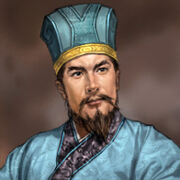
Liu Biao (142-208) was Governor of Jing and a member of the eight geniuses of Jiang Xia. He led Jing to a time of stability amidst the chaos of the central plains. Due to his indecisive nature, he missed out on numerous opportunities to unify the land.
Biography
Liu Biao was a descendant of Emperor Jing of Han, who reigned as Emperor of the Han Dynasty from 157 to 141 BC. Liu Biao was a nobleman from an esteemed family, of the same house as the emperors that ruled China from 206 BC to 220 AD, and was very distantly related to Liu Bei, descended from Emperor Liu Bang of Han. Liu Biao was made the Governor of Jing Province during the Later Han, and controlled one of the largest provinces of the Han Dynasty, with his capital at Xiangyang. Liu Biao did not take part in the Yellow Turban Rebellion campaign in 184 AD or the Alliance against Dong Zhuo in 190 AD, instead maintaining stability in his own region. Liu Biao's first major conflict would only come after Dong Zhuo's defeat at the Battle of Hulao Gate in 190, which was the epoch of the Three Kingdoms era, starting a series of wars between warlords.
Liu Biao made enemies with Yuan Shu, a powerful warlord from Yang Province who controlled large armies and planned to make himself the emperor. Liu Biao declared war on him, so Yuan Shu sent his generals Sun Jian, Sun Ce, Han Dang, Huang Gai, and Cheng Pu to invade Jing Province. Liu Biao allied with warlord Yuan Shao of northern China in an attempt to recapture the Imperial Seal from Sun Jian, who found it amongst the ruins of the former capital of Luoyang. Liu Biao and Yuan Shao combined forces and fought Sun Jian's army at Xiangyang. Although Sun Jian nearly won a victory there, Liu Biao's general Lu Gong lured him into an ambush by Huang Zu, and Sun Jian was killed by several arrows. The army of Sun Jian fell into the hands of Sun Ce, who retreated back to Yang Province.
Liu Biao's victory made him even more powerful, but once more, he refused to take this advantage and unite the land. In 197 AD, he granted assistance to minor Jing Province ruler Zhang Xiu of Wancheng when the powerful central warlord Cao Cao besieged him in Wan Castle. Liu Biao personally commanded reinforcements to Wan Castle, and he assaulted Cao Cao's main camp, held by Guo Jia. However, his army was repulsed, and Wan Castle fell to Cao Cao by siege in 198 AD. Zhang Xiu was forced to surrender and was made an official under Cao Cao, leaving Liu Biao without an ally.
In 203 AD, the wars of the other warlords came to Liu Biao's domain in two parts. First, the warlord Liu Bei wandered to Jing Province with his generals Guan Yu, Zhang Fei, and Zhao Yun in search of a home, as Cao Cao conquered Xu Province and defeated Yuan Shao. Liu Biao was happy to accomodate them by making Liu Bei the Governor of Xinye. However, 100,000 troops under Cao Ren were sent by Cao Cao to pursue Liu Bei. With the help of the strategist Xu Shu, Liu Bei broke through Cao Ren's Eight Gates Formation and destroyed the Cao Cao army, forcing Cao Cao to retreat. The next conflict involved the army of Sun Quan, Sun Jian's third son, who sought revenge for his father's death in 192 AD; Sun Ce was killed by Xu Gong in 200 AD at Xuchang. Sun Quan's army of several thousands met Liu Biao's 30,000+-strong army under Huang Zu at Xiakou, and Sun Quan was able to defeat the enemy. Huang Zu retreated, but Sun Quan's general Ling Cao was killed by Gan Ning while trying to pursue him. The battle left Liu Biao defeated, and in 208 AD, this defeat was followed up with the Battle of Jiangxia, where Sun Quan's 25,000-strong army defeated Huang Zu's 30,000+-strong army again, slaying Huang Zu, Chen Jiu, and Zhang Shuo with 30,000 Liu Biao's Forces deaths.
Later in 208 AD, Liu Biao took ill. Cao Cao mounted an offensive against Jing Province with his army, hoping to take over Liu Biao's vast territories and take command of his massive armies. Liu Biao met with Liu Bei, and asked him about which son he should choose to succeed him. Liu Bei advised him to do the natural thing and choose his eldest son Liu Qi, but he knew that his wife would favor the youngest son Liu Cong. Liu Biao decided that Liu Qi should succeed him, but he died that same year, and his wife edited his will so that Liu Cong inherited all but one of his cities. Cao Cao forced Liu Cong to surrender in a short amount of time, and Liu Qi fled to serve Liu Bei, narrowly avoiding death, while Liu Cong was later murdered.
